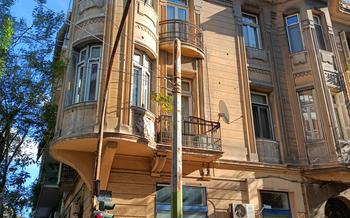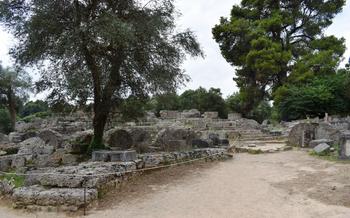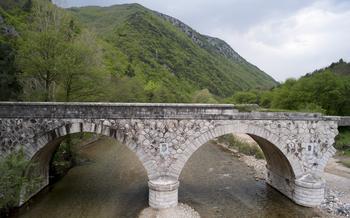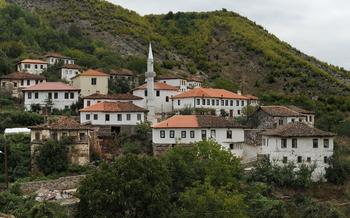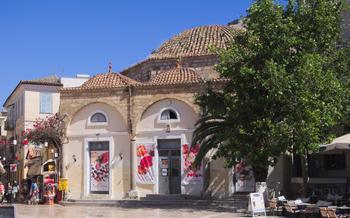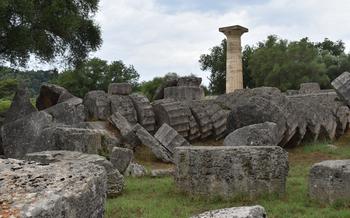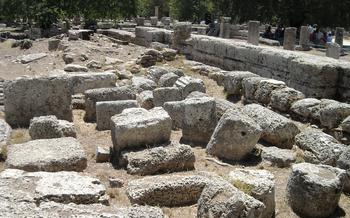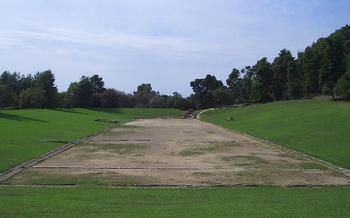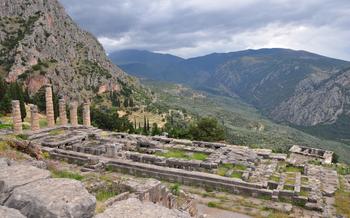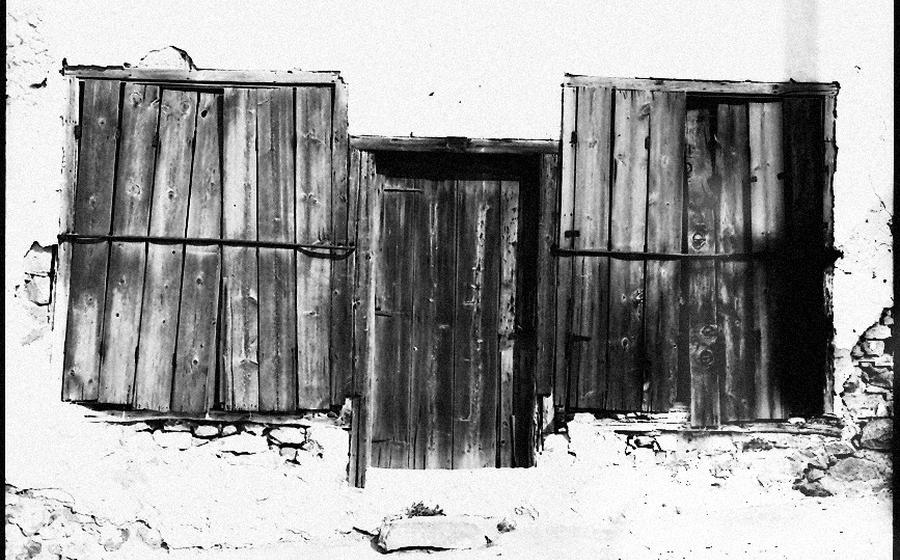
Seminars of Traditional Dances
- Historical Background
- Educational Experience
- Dance Styles
- Live Music
- Cultural Immersion
- Workshops and Classes
- Performances
- Costumes and Attire
- Social Events
- Accommodation
- Transportation
- Food and Drink
- Other Attractions in Xanthi
- Insider Tip
Historical Background
The ancient roots of traditional dance seminars in Xanthi, Greece, can be traced back to the region's rich cultural heritage. In the 19th century, local dance enthusiasts and scholars began organizing informal gatherings to preserve and share traditional dance forms. These gatherings evolved into structured seminars in the early 20th century, with the aim of passing down the region's dance legacy to future generations.
Over the years, these seminars have played a crucial role in preserving and promoting Xanthi's traditional dances. They have attracted participants from all over the world, contributing to the dissemination and appreciation of Greek dance culture. Today, the seminars continue to thrive, offering a unique opportunity for dancers to immerse themselves in the vibrant traditions of Xanthi and learn from renowned instructors.
Educational Experience
The seminars in Xanthi offer a comprehensive learning experience that goes beyond mere dance steps. Participants are immersed in the rich cultural heritage of traditional Greek dance, gaining a deep understanding of its history, symbolism, and social significance. The curriculum covers a wide range of dance styles, from the lively syrtos and tsipouro to the graceful zeibekiko and hasapiko.
In addition to learning the intricate footwork and body movements, participants also gain insights into the cultural context of each dance. Instructors provide detailed explanations of the origins, symbolism, and traditional occasions associated with each dance style. This holistic approach allows participants to develop a deeper appreciation for the cultural significance of traditional Greek dance.
The seminars also emphasize the importance of live music in Greek dance. Participants have the opportunity to learn from experienced musicians who provide live accompaniment during the workshops and classes. This allows dancers to develop a strong sense of rhythm and timing, essential for mastering the intricate steps and patterns of traditional Greek dance.
Dance Styles
The traditional Greek dance styles taught at the seminars in Xanthi are as diverse as the country's rich history and geography. Each region of Greece has its unique dance traditions, reflecting the local culture, customs, and way of life.
Kalamatianos: - Lively and energetic circle dance, often performed at weddings and celebrations. - Simple steps that allow dancers to join in easily, making it a popular choice for beginners.
Sirtaki: - Graceful and elegant dance made famous by the film "Zorba the Greek." - Slow, deliberate movements that build in tempo and intensity, representing the struggle and joy of life.
Tsamikos: - Fast-paced and intricate dance originating from Epirus, known for its complex footwork and energetic leaps. - Traditionally performed by men, but now enjoyed by dancers of all genders.
Sousta: - Lively and playful dance from the Peloponnese, characterized by quick steps, turns, and spins. - Often performed in pairs, allowing dancers to showcase their agility and coordination.
Hasapiko: - Traditionally a men's dance, known for its strong and rhythmic movements. - Imitates the movements of a butcher, with dancers stomping and clapping in unison.
Live Music
Music plays a vital role in traditional Greek dance, acting as an integral component that guides and enhances the dance movements. The seminars in Xanthi showcase the importance of live music by featuring talented musicians who provide a vibrant and authentic atmosphere. These musicians, often skilled in traditional Greek instruments such as the laouto, santouri, and lyra, create a captivating soundscape that complements the dance steps and immerses participants in the cultural experience. The synergy between the live music and the dance creates an exhilarating and unforgettable experience that transports participants into the heart of Greek tradition.
Cultural Immersion
The seminars in Xanthi offer an unparalleled opportunity to immerse yourself in the vibrant Greek culture. Dancing is an integral part of Greek life, and these seminars provide a unique chance to learn about its history, traditions, and customs. Participants will have the chance to interact with local instructors and fellow dancers, who will share their knowledge and passion for Greek culture. Through workshops, classes, and social events, the seminars create a welcoming and inclusive environment where participants can embrace the Greek spirit and make lasting connections.
Workshops and Classes
The traditional dance seminars in Xanthi offer a range of workshops and classes tailored to suit different levels of experience, from complete beginners to seasoned dancers. These workshops and classes are typically held in small groups, allowing for personalized attention and guidance from experienced instructors.
Beginners' workshops provide a comprehensive introduction to the basic steps, rhythms, and techniques of traditional Greek dances. Participants learn the fundamental movements, such as the syrtos, kalamatianos, and hasaposervikos, which form the foundation of many Greek dances. As they progress, dancers can advance to intermediate and advanced workshops, where they explore more complex dance patterns, variations, and improvisational techniques.
The duration of the workshops and classes can vary depending on the level of instruction and the specific dance style being taught. Some workshops may span several days or weeks, providing participants with a deep immersion into the art form. Others may be shorter, offering a condensed but intensive learning experience.
For those seeking a more personalized learning experience, private lessons are also available. These lessons allow dancers to work one-on-one with an instructor, focusing on specific areas of improvement or learning new dance styles at their own pace.
Performances
The culmination of the educational experience at the Xanthi seminars is the opportunity to participate in public performances or demonstrations. These events provide a platform for students to showcase their newly acquired skills and share the joy of traditional Greek dance with the broader community.
The performances are typically held in traditional venues such as village squares, theaters, or cultural centers. They are open to the public and often draw large crowds of locals and tourists eager to witness the vibrant spectacle of Greek dance.
Participating in a public performance is an exhilarating and rewarding experience for students. It allows them to put their training into practice, perform alongside experienced dancers, and receive recognition for their efforts. The performances also serve as a valuable opportunity for cultural exchange, as they bring together people from different backgrounds and generations to celebrate the shared heritage of Greek dance.
Costumes and Attire
Traditional costumes play a crucial role in Greek dance, adding authenticity and visual appeal to performances. During the seminars in Xanthi, participants have the opportunity to wear these stunning outfits, which vary depending on the region and dance style.
The costumes for women typically consist of a long, flowing skirt, a fitted bodice, and a colorful apron. The skirts are often made of lightweight fabrics like cotton or silk, allowing for freedom of movement during dance. Elaborate embroidery and embellishments adorn the bodice and apron, showcasing the intricate craftsmanship of local artisans.
Men's costumes, while simpler in design, are equally striking. They usually comprise a pair of baggy trousers, a white shirt, and a waistcoat or jacket. The trousers are often made of wool or linen, providing comfort and durability for energetic dance movements. The waistcoats or jackets are often decorated with intricate embroidery or metallic buttons, adding a touch of elegance to the ensemble.
For those who don't have their own costumes, there are several options available. Some of the seminar organizers offer costume rental services, ensuring that participants can immerse themselves fully in the experience without worrying about attire. Alternatively, there are local shops in Xanthi where authentic costumes can be purchased. These shops often have a wide selection of costumes to choose from, allowing participants to find the perfect outfit to match their style and preferences.
Wearing traditional costumes during the seminars not only enhances the overall experience but also fosters a sense of cultural connection and authenticity. It allows participants to step back in time and truly embody the spirit of Greek dance.
Social Events
The traditional dance seminars in Xanthi offer more than just dance lessons; they also provide an opportunity for social interaction and cultural exchange. Throughout the duration of the seminars, there are numerous social events and gatherings organized to foster a sense of community among participants and locals. These events provide a platform for dancers to socialize, share their experiences, and learn more about Greek culture.
One of the highlights of the social events is the traditional Greek night. This event typically involves a feast of delicious Greek cuisine, live music, and dancing. Participants are encouraged to wear traditional costumes and join in the lively dances, creating a festive and vibrant atmosphere. It's a chance to immerse oneself in the local culture and make new friends from around the world.
Another popular social event is the farewell party, which marks the end of the seminar. This event is a celebration of the friendships and memories formed during the week. Participants gather to share stories, dance together, and bid farewell to their newfound friends. It's a bittersweet moment that leaves a lasting impression on all who attend.
These social events are an integral part of the traditional dance seminars in Xanthi. They provide participants with a chance to connect with locals, learn about Greek customs, and create lasting memories.
Accommodation
When planning your trip to Xanthi to attend the traditional dance seminars, it's essential to choose suitable accommodation that meets your needs and budget. The city offers a range of options, from budget-friendly hostels to comfortable guesthouses and luxurious hotels.
For a truly immersive experience, consider staying in a traditional Greek guesthouse or hotel. These establishments often feature charming architecture, warm hospitality, and a chance to interact with locals. Look for guesthouses in the old town or near the seminar venues to be within walking distance of the activities.
If you prefer modern amenities and convenience, several hotels offer comfortable accommodations with easy access to the city center. Check for hotels with facilities such as swimming pools, fitness centers, and restaurants.
For those on a tighter budget, hostels and budget hotels provide affordable options without compromising comfort. These establishments are often located near the city center and offer shared or private rooms.
When booking your accommodation, consider factors such as location, amenities, and proximity to the seminar venues. Make sure to book in advance, especially during the peak tourist season, to secure your preferred choice.
Transportation
Reaching Xanthi is a breeze, with multiple transportation options available. If you prefer air travel, the city boasts its own airport, Xanthi International Airport (KXA), with direct flights from major cities in Greece and neighboring countries. Alternatively, you can opt for a scenic train journey through the picturesque Greek countryside. Several daily trains connect Xanthi to Thessaloniki, Athens, and other major cities. For those who enjoy the flexibility of road travel, Xanthi is well-connected by bus routes, offering convenient and affordable transportation from various cities across Greece. Once in Xanthi, getting around is a breeze. The city's compact size makes it easy to navigate on foot or by bicycle. However, if you prefer a more leisurely mode of transport, taxis are readily available and reasonably priced.
Food and Drink
Taste the Delights of Xanthi Cuisine:
Indulge in the culinary delights of Xanthi, where traditional Greek cuisine is celebrated with passion and authenticity. Explore the vibrant local markets, where you can find fresh produce, herbs, and spices that form the foundation of Xanthi's unique dishes.
For a truly immersive experience, visit one of the many traditional tavernas or restaurants nestled in the heart of the city. These establishments offer a warm and inviting atmosphere, where you can savor authentic Greek dishes prepared with love and care.
Must-try dishes include the mouthwatering souvlaki, tender grilled meats skewered on a stick and seasoned to perfection. Moussaka, a delicious casserole made with layers of eggplant, potatoes, and minced meat, is another popular choice. Don't forget to sample the local tsipouro, a traditional Greek spirit that is often served with meze platters of small dishes.
Pair your meals with a glass of local wine from the nearby vineyards, known for producing some of the finest wines in Greece. Whether you prefer red, white, or rosé, you'll find a variety of options to complement your culinary journey.
As you explore Xanthi's culinary scene, engage with the locals and ask for recommendations. They'll be more than happy to share their favorite dishes and hidden gems, ensuring you have an unforgettable gastronomic experience.
Other Attractions in Xanthi
In addition to the traditional dance seminars, Xanthi offers a range of other attractions that visitors can explore. History buffs can delve into the city's rich past at the Archaeological Museum of Xanthi, which houses a collection of artifacts from the region's ancient civilizations. The Folk Art Museum showcases traditional costumes, textiles, and handicrafts, providing a glimpse into the local culture.
Nature lovers can escape the city's hustle and bustle at the Xanthi Forest, a sprawling green oasis just a short drive from the city center. The forest offers a variety of hiking trails, picnic areas, and opportunities for wildlife watching.
For those seeking a unique shopping experience, the Old Town of Xanthi is a must-visit. This charming neighborhood is lined with cobblestone streets, traditional houses, and shops selling local handicrafts, souvenirs, and delicacies.
Other landmarks worth visiting include the medieval Xanthi Castle, which offers panoramic views of the city, and the Kosynthos Bridge, an impressive stone arch bridge built in the 19th century.
Insider Tip
My first traditional dance seminar in Xanthi was an unforgettable experience. As a novice dancer, I was initially nervous, but the welcoming atmosphere and patient instructors quickly put me at ease. Over the course of the week-long seminar, I immersed myself in the vibrant culture of Greek dance, learning intricate steps, traditional rhythms, and the history behind each dance.
One evening, we were invited to a local taverna for a special performance. Dressed in our traditional costumes, we joined a group of experienced dancers and musicians for a night of lively music and dancing. As we performed for an enthusiastic audience, I felt a sense of accomplishment and pride, knowing that I had become a part of this rich cultural tradition.
My advice to anyone considering attending a traditional dance seminar in Xanthi is to embrace the experience wholeheartedly. Come with an open mind and a willingness to learn, and you'll be amazed at how much you can discover about yourself, Greek culture, and the joy of dance.
